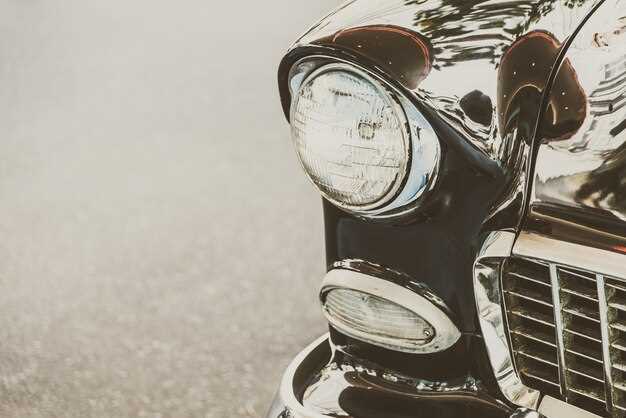
Owning a classic car is a passion that comes with both joy and responsibility. These vehicles are often more than mere modes of transportation; they represent a significant investment and a cherished part of automotive history. As such, ensuring that your classic car is adequately protected is crucial. Traditional auto insurance policies may not provide the coverage you need, which is why understanding the specifics of classic car insurance is essential.
Classic car insurance is tailored to the unique requirements of vintage vehicles, accounting for factors like rarity, restoration costs, and usage frequency. Unlike standard cars, classic cars often appreciate in value rather than depreciate, making proper valuation a key aspect of your insurance. It’s important to assess not only the market value of your car but also any modifications and restorations that may enhance its worth.
In this article, we will explore the critical elements of insuring your classic car, including the benefits of specialized policies, how to determine the right coverage limits, and what factors influence your premium rates. By arming yourself with the right knowledge, you can ensure that your prized possession is protected against unforeseen events, allowing you to enjoy the open road with peace of mind.
Insuring Your Classic Car: What You Should Know

Insuring a classic car differs significantly from insuring a standard vehicle. Understanding the key elements involved in this process is essential for ensuring that your cherished automobile is adequately protected.
Here are critical factors to consider when insuring your classic car:
- Understand Classic Car Definition:
A classic car is generally defined as a vehicle that is over 25 years old, although some insurers may classify cars differently based on vintage, rarity, and condition. Make sure your car qualifies under your insurer’s classic car policy.
- Choose the Right Insurance Type:
There are various types of insurance policies available for classic cars:
- Agreed Value Policy: This policy ensures that the car is covered for a pre-determined value, agreed upon by both the owner and the insurance company.
- Market Value Policy: Insures the vehicle at its current market value, which may fluctuate over time.
- Collector Car Insurance: Designed specifically for car collectors, offering specialized coverage and benefits.
- Consider Usage:
Most classic car insurance policies have mileage limits and restrictions on how you use your car. Determine how often and for what purposes you will drive your classic car to ensure you select an appropriate policy.
- Evaluate Coverage Options:
Explore the coverage options available to suit your needs:
- Comprehensive Coverage: Protects against theft, vandalism, and damage not resulting from a collision.
- Collision Coverage: Covers damages resulting from accidents.
- Liability Coverage: Protects you in case of injuries or damages to other parties.
- Roadside Assistance: Provides help in case of breakdowns.
- Discounts and Benefits:
Many insurance companies offer discounts for classic car owners. Potential discounts include:
- Membership in classic car clubs
- Low annual mileage
- Anti-theft devices
- Keep Documentation Ready:
Having proper documentation is crucial. Keep records of repairs, maintenance, and modifications, as well as photographs of your vehicle, which may be required during the claims process.
- Shop Around:
Compare quotes from different insurers. Look for companies that specialize in classic cars, as they often understand the unique needs of classic car owners better than general insurers.
In conclusion, securing the right insurance for your classic car requires careful consideration of its specific needs and characteristics. Take your time to research and evaluate various options, ensuring that your beloved vehicle has the protection it deserves.
Understanding Coverage Options for Classic Cars
When it comes to insuring a classic car, it’s crucial to understand the specific coverage options available to protect your investment. Traditional auto insurance policies often do not provide adequate coverage for classic vehicles due to their unique value and usage. Here are the key coverage options to consider:
Agreed Value Coverage: This type of policy ensures that in case of a total loss, you receive a pre-determined amount agreed upon at the time of purchase. This eliminates disputes over depreciation and provides peace of mind knowing your car is insured for its true value.
Actual Cash Value Coverage: Unlike agreed value, this policy bases compensation on the vehicle’s current market value at the time of the loss, taking into account depreciation. This option can lead to lower payouts and may not fully compensate you for the value of your classic car.
Collector Car Insurance: Specialized insurers offer policies specifically designed for classic cars, acknowledging their unique characteristics and values. These policies generally include agreed value coverage, along with other benefits like limited mileage discounts and specialized coverage for restoration parts.
Liability Coverage: Just like any standard auto insurance, classic cars need liability coverage to protect against bodily injury or property damage to others. Ensure you meet state minimum requirements while considering higher limits to safeguard your assets.
Comprehensive and Collision Coverage: Comprehensive insurance covers non-collision incidents such as theft, fire, or vandalism, while collision coverage helps pay for damages sustained in an accident. These options are vital for classic car owners who want to protect against various risks.
Roadside Assistance: An essential addon for classic car insurance, roadside assistance can provide peace of mind while traveling. This coverage typically includes services like towing, battery jump-starts, and flat tire assistance.
Understanding these coverage options helps classic car owners choose the right insurance policy that meets their specific needs. It’s essential to review your policy regularly and adjust coverage based on any modifications or changes to the vehicle’s market value.
Evaluating the Value of Your Classic Car for Insurance Purposes

Determining the value of your classic car is a crucial step in securing adequate insurance coverage. This process not only protects your investment but also ensures that you receive fair compensation in the event of a loss. Here are key factors to consider when evaluating your classic car’s value.
Firstly, conduct a comprehensive market analysis. Research similar vehicles, focusing on their sale prices, condition, and mileage. Classic car sales platforms, auctions, and collector car shows can provide valuable insights into current market trends. Document the prices of comparable models to establish a benchmark for your own vehicle.
Secondly, consider the vehicle’s condition. A detailed assessment of the car’s frame, engine, exterior, and interior can significantly influence its value. An independent appraisal by a qualified classic car expert can offer an unbiased evaluation. Be sure to factor in any restoration work, upgrades, or modifications, as these can either enhance or diminish the car’s worth.
Additionally, assess the car’s rarity and demand. Limited production models or those with unique features tend to have higher values due to their desirability among collectors. Investigate production numbers and historical significance to better understand the rarity of your vehicle.
Another critical factor is the vehicle’s provenance. A well-documented history, including previous ownership, maintenance records, and any awards or recognitions, can add considerable value. Be sure to keep all relevant documents organized and available for your insurance provider.
Lastly, consider future appreciation potential. Some classic cars are likely to appreciate over time due to growing interest among collectors. Assessing trends in the classic car market can help you make informed predictions about your car’s future value.
In conclusion, accurately evaluating the value of your classic car involves a combination of market research, condition assessment, rarity consideration, documentation, and future potential. By taking these factors into account, you can ensure that your classic car is properly insured and protected.
Choosing the Right Insurance Company for Your Classic Vehicle
Selecting an insurance company for your classic car is a crucial decision that can significantly impact the value and protection of your investment. When evaluating potential insurers, consider the following factors:
Specialization in Classic Cars: Look for companies that specialize in insuring classic and antique vehicles. These insurers often understand the unique needs of classic car owners and may offer specialized coverage options not available with standard auto insurance providers.
Coverage Options: Assess the coverage options provided. Key elements to consider include agreed value coverage, which ensures that in the event of a total loss, you receive the full insured amount instead of market value. Other important coverages may include protection against theft, vandalism, and natural disasters.
Claims Process: Research the claims process of each company. A straightforward and quick claims procedure is essential, especially for valuable classic cars. Look for customer reviews and ratings to gauge the efficiency and reliability of the insurer’s claims handling.
Discounts and Benefits: Inquire about available discounts. Some insurers provide reduced rates for car club members, secure storage, or limited annual mileage. Additionally, check for any added benefits, such as roadside assistance or coverage for spare parts, that may enhance the value of the policy.
Financial Stability: Ensure the insurance company has a solid financial standing. You can check ratings from independent agencies like A.M. Best or Standard & Poor’s. A financially stable company is more likely to fulfill its obligations in the event of a claim.
Customer Service: Exceptional customer service is vital in selecting an insurer. Engage with representatives before purchasing a policy to evaluate their knowledge and responsiveness. A reliable insurer should provide clear communication and support when needed.
Compare Multiple Quotes: Do not settle for the first option. Obtain quotes from multiple insurers to compare coverage and pricing. Make sure you are clear about the details of each policy to make an informed decision based on your needs and budget.
By carefully evaluating these factors, you can choose an insurance company that not only provides adequate protection for your classic vehicle but also supports you throughout the policy period, ensuring peace of mind as you enjoy your cherished car.
